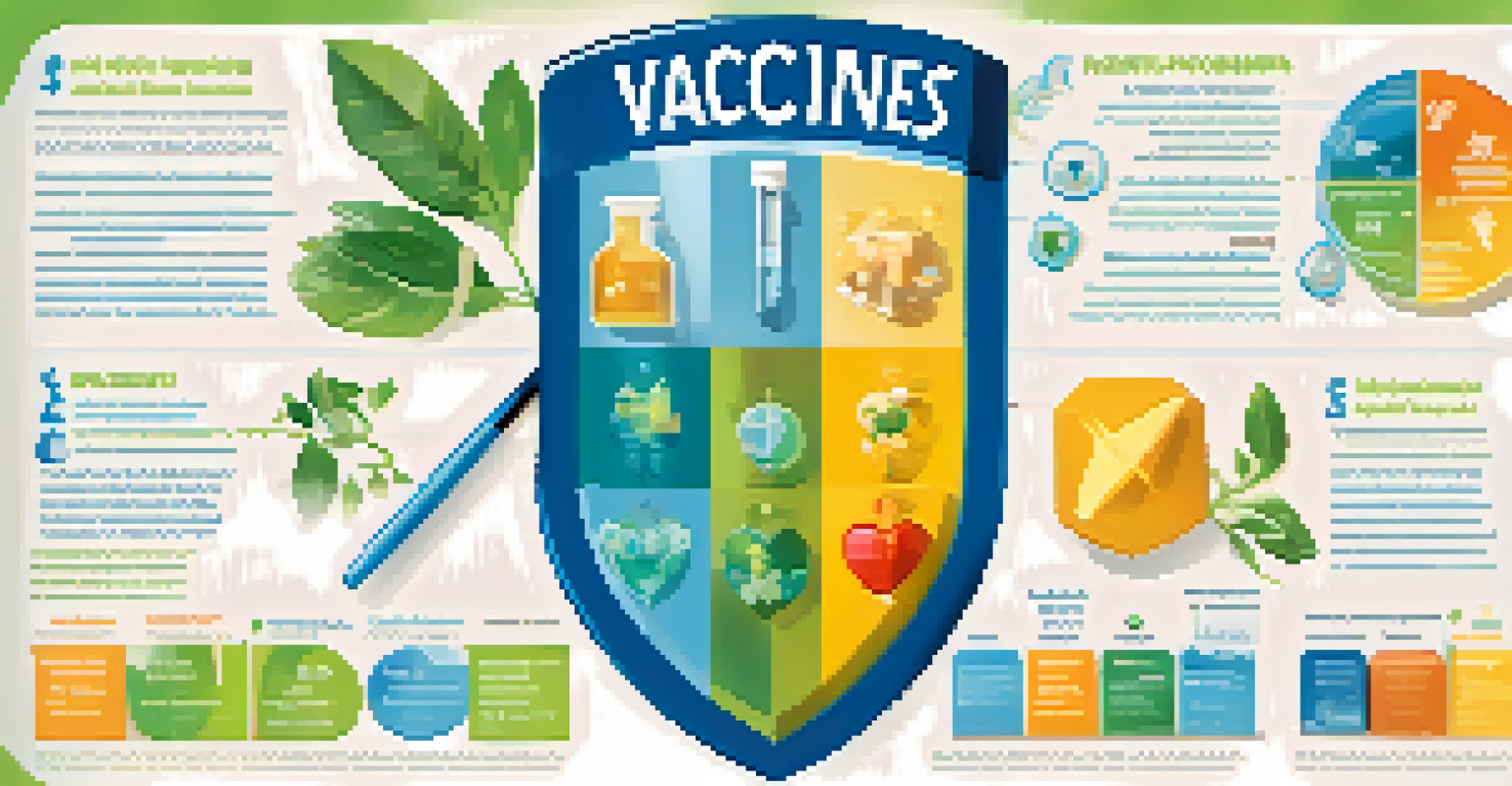Vaccination Myths: Debunking Common Misconceptions Today

Myth 1: Vaccines Cause the Diseases They Prevent
One of the most widespread myths is that vaccines can cause the diseases they are meant to prevent. In reality, vaccines are designed to expose the immune system to a harmless part of the pathogen, such as a protein or inactive virus. This process helps the body build immunity without causing the actual disease. It's like a fire drill; you prepare for the real thing without facing danger.
Vaccines are safe, effective, and necessary for public health.
The ingredients in vaccines, including weakened or inactivated pathogens, do not have the capability to cause illness. Instead, they train your immune system to recognize and fight off the real virus or bacteria in the future. Just as a practice run helps you feel ready for an emergency, vaccines ensure that your body knows how to respond effectively if exposed to the disease.
Understanding this can alleviate fears and encourage more people to get vaccinated, ultimately leading to healthier communities. The more we vaccinate, the closer we come to eradicating these diseases altogether, which is a win for public health.
Myth 2: Natural Immunity is Better Than Vaccine-Induced Immunity
Another common misconception is that getting sick provides better immunity than vaccines. While it’s true that natural infections can lead to immunity, they often come with severe health risks and complications. For example, measles can lead to pneumonia or encephalitis, which are serious conditions that can result in hospitalization or death.

Vaccines, on the other hand, offer a way to gain immunity without experiencing the full-blown effects of the disease. It's like learning to swim in a safe pool rather than jumping into the ocean; you still gain the skills but without the immediate dangers. Additionally, vaccine-induced immunity is often just as strong and long-lasting as natural immunity.
Choosing vaccination can protect not only yourself but also those around you who may be vulnerable. This collective immunity, known as herd immunity, plays a crucial role in preventing outbreaks and keeping entire communities safe.
Myth 3: Vaccines Contain Dangerous Chemicals
Many people worry that vaccines contain harmful chemicals that could endanger their health. In reality, the ingredients in vaccines are thoroughly tested and regulated to ensure safety. While it's true that some vaccines contain preservatives and adjuvants, these components are present at safe levels that have been deemed non-toxic.
The greatest threat of childhood diseases lies in the fact that they are not childhood diseases at all, but diseases of adults.
For example, thimerosal, a mercury-containing compound, was used as a preservative in some vaccines. However, extensive research has shown that it does not pose a threat to human health, and thimerosal has been removed from most childhood vaccines as a precaution. It's essential to remember that the benefits of vaccination far outweigh any potential risks associated with these components.
Understanding the facts about vaccine ingredients can help dispel fears and encourage informed decisions. The trust we place in vaccines is built on decades of scientific research and a commitment to public health.
Myth 4: Vaccines Are Only Necessary for Children
A common belief is that vaccines are only important for children, but that couldn't be further from the truth. Adults also require vaccinations to maintain immunity against various diseases. For instance, vaccines like the flu shot and shingles vaccine are crucial for older adults who may be more vulnerable to these infections.
As we age, our immune systems can weaken, making us more susceptible to diseases that vaccines can help prevent. Think of vaccines as a shield that needs to be regularly updated to ensure maximum protection. Just like you wouldn’t drive a car without checking the brakes, it’s wise to keep your vaccinations current throughout your life.
Staying up to date with vaccinations can protect not only your health but also the health of those around you. By ensuring that everyone is vaccinated, we create a safer environment for all ages.
Myth 5: Vaccines Are Not Effective
Some people believe that vaccines are not effective and that vaccinated individuals can still get sick. However, vaccines have been shown to significantly reduce the incidence of many diseases. For example, since the introduction of the measles vaccine, cases have dropped by more than 90% in countries with high vaccination rates.
While it's true that no vaccine offers 100% protection, they greatly decrease the risk of infection and can lead to milder cases if illness does occur. Think of it like wearing a seatbelt; it doesn’t guarantee you won’t get hurt in an accident, but it significantly lowers the risk of severe injury.
Moreover, high vaccination rates within a community contribute to herd immunity, protecting those who cannot be vaccinated, such as infants or individuals with certain health conditions. Vaccines are a vital tool in the fight against infectious diseases.
Myth 6: The Immune System Can’t Handle Multiple Vaccines
Some individuals worry that giving multiple vaccines at once overwhelms the immune system. In truth, our immune system is incredibly capable and encounters countless pathogens every day. Vaccines are designed to work with the immune system, helping it recognize and combat specific threats without causing harm.
It's similar to a busy restaurant kitchen: multiple orders can be handled efficiently without chaos. In fact, the immune system responds to multiple vaccines just as effectively as it does to a single one. By vaccinating against several diseases at once, we can ensure comprehensive protection and save time during doctor visits.
Understanding how our immune system functions can help ease concerns about vaccination schedules. The science behind vaccines supports their safety and effectiveness, making them a crucial part of public health.
Myth 7: Vaccination Leads to Autism
One of the most damaging myths is the unfounded claim that vaccines cause autism. This misconception originated from a discredited study that has been thoroughly debunked by extensive research. Numerous large-scale studies have found no link between vaccinations and autism, reinforcing the safety of immunization.
The idea that vaccines could lead to autism is often fueled by correlation, where two events seem related but are not causally linked. For many parents, the timing of vaccinations coincides with the age when autism symptoms typically emerge, leading to confusion. It’s crucial to approach such claims with skepticism and rely on credible scientific evidence.

Understanding the truth behind this myth can help alleviate fears and encourage parents to prioritize their children's health through vaccination. The focus should always be on ensuring the well-being of our children through proven medical practices.
Myth 8: Vaccines Are a Government Conspiracy
Some individuals believe that vaccination programs are part of a government conspiracy to control the population. This myth often stems from distrust in authority and misinformation. However, vaccines are developed through rigorous scientific research and are endorsed by health organizations worldwide, not just governments.
The primary goal of vaccination is to protect public health and prevent the spread of infectious diseases. Consider vaccines as a community effort; they work best when everyone participates. Just as we rely on firefighters to keep our neighborhoods safe, we can trust health professionals to guide us towards safer, healthier futures.
Engaging in open discussions about vaccines and addressing concerns can help rebuild trust. It's essential to base our health decisions on facts rather than unfounded fears, ensuring we protect ourselves and our communities.